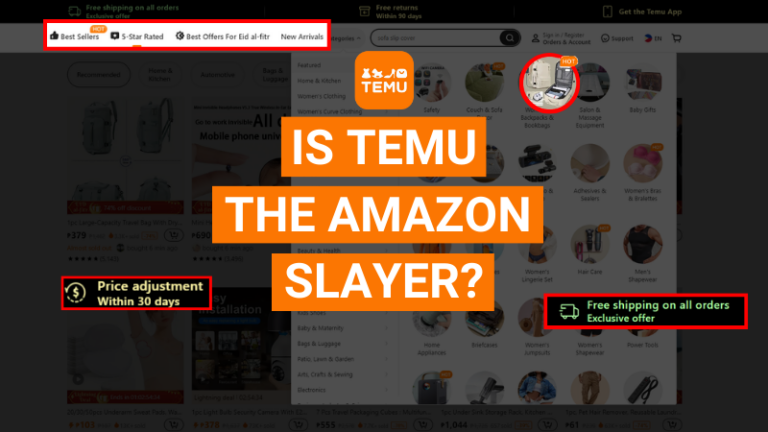What Temu Might Offer US Amazon Sellers
While Temu is a new platform to US shoppers, it is huge in China. In just a few years it rose from nothing to competing head-to-head with Ali Baba and AliExpress. When I first heard about it, I thought “this will never fly in the US.” I couldn’t see how sellers would make money with such cheap prices and I couldn’t imagine that US buyers used to free two-day shipping would wait weeks to get their products.
When I saw their ads during the Superbowl I was astonished, and decided to see what this platform might offer US brands. While brands with manufacturing in China have already been able to sell on Temu, the platform just opened to US sellers earlier this month.
Temu is basically a cross between eBay and Shopify for those who manufacture in China. It solves a major pain point for manufacturers in that it tells them exactly how many units to make and when. Rather than manufacturing huge quantities of goods and sending them to US warehouses to sell on Amazon, Temu manufacturers are told how many units to make every week. They send them to a Temu warehouse in China and then Temu ships the individual orders to the US in huge containers for delivery to buyers.
By convincing US buyers to wait a few days or weeks, Temu can consolidate orders from many buyers and provide just-in-time requests to manufacturers. They also consolidate many orders from different manufacturers into containers that are sent to the US cheaply. It most resembles a consignment arrangement vs more traditional retail like Amazon.
Temu embodies the vision Amazon had when they invited Chinese sellers to the platform – cut out the middleman, reduce prices. Temu’s prices are lower because their fees are so much lower than Amazon’s, and because they cut out so much of the risk and potential over production of traditional sales models for manufacturers. Temu allows manufacturers to quickly change with the whims of consumers as well. With brands banding together to share logistics costs, prices are dramatically lower.
Temu’s US model allows sellers with warehouses in the US to handle fulfillment and logistics themselves. Temu has added badges that say, “local warehouse” and “faster delivery” to US listings. The first 1000 US sellers are based in China and have US warehouses. But there will be benefits for non-Chinese US and EU Amazon brand-sellers as well.
Benefits to Amazon Sellers/Brands:
- Cheap shipping from China to the US.**
Temu has over 100 million active US buyers already.
Temu handles all the shipping logistics for a low price (if the manufacturing is in China).
Amazon does not currently include Temu in its pricing-check algorithm, according to Reuters. That means Amazon sellers aren’t currently penalized for offering their products at a cheaper price on Temu.
Pressure from Temu could do what Congress cannot – pressure Amazon to lower some of its seller fees.
Temu could do what Walmart and eBay cannot – truly compete with Amazon
How Temu Works vs Amazon:
- Selling on Temu is free. Temu makes modest fees for every sale (2%-5%).
- It’s a marketplace best suited for cheap goods sold mostly on price like household goods, electronics and fast fashion. High quality goods in a higher price range will do better on Amazon and Walmart.
- Temu drives the traffic and heavily incentivizes buyers to purchase multiple units and to invite their friends to buy the same products. The blend of social interaction, “gamification,” and incentives strongly encourages shoppers to buy more than they might have planned to, originally.
- Temu is advertising heavily including its recent Super Bowl ads.
- You handle all the customer service and logistics if you are a US seller. There is no FBA equivalent.
Getting Started with Temu:
You can register with Temu’s parent company Pinduoduo or send and email to: seller@temu.com to receive an invite code.
Merchant registration requires that you select your business type and kind of store you will run on Temu (flagship, department, exclusive seller, or authorized retailer).
Required documents:
Valid ID (passport or driver’s license)
Business license
Distribution or logistics documentation (i.e. proof of warehouse partners)
Documentation of brand qualification (trademark or authorization letters)
Possibly a utility bill (for the US marketplace, I’m speculating, as per the INFORM ACT. The others are from their website).
Once submitted, Temu will let you know if you are approved within 3-7 business days by text.
Temu Seller Profile
-
- Product samples of your most popular items must be shipped to Temu for review and approval. That’s inspiring, but insane. Not sure if the US sellers will be subject to this.
-
- Temu’s prohibited product list is…aspirational and sometimes funny. No sexual services on the platform, please. Anyone selling on Amazon won’t be phased by this list.
Pros and Cons of Temu for US-Based Amazon Sellers
Pros
Cons
100 million US buyers already
Chinese owned – Pinduoduo will have access to all your seller data
Could grow as large as Amazon
Temu is basically the dollar store of online selling – not a good fit for every brand
Lower seller fees than Amazon
You must have your own fulfillment set up – no FBA
Amazon isn’t comparing prices on Temu yet – no Amazon penalties for lower Temu prices
Unknown how/if they will support Intellectual Property rights
Just-in-time manufacturing is possible due to allowed slower delivery times
Thin margins, cut-throat pricing. If you dislike competing against Chinese sellers on Amazon, you really won’t like Temu
Temu incentivizes multiple purchases more and better than Amazon does
Temu has unbelievably low prices compared to Amazon – seemingly too good to be true – and that is slowing acceptance a little bit by some US buyers. When more American brands join the platform, and products are delivered within a week instead of three, that reluctance should fade. Whether US sellers will be able to make money on the platform remains to be seen.
Dollar-type stores in America have a reputation for cheap, plastic goods and poor treatment of their workers. That has not stopped them from growing tremendously and from stealing sales from Walmart, Target, CVS, grocery and other stores.
As a compliance and e-growth consultant, I have questions about how they will enforce rule violations, whether it will be an easier or harder platform for Amazon sellers and how Temu sellers promote their products vs. Amazon sellers. I look forward to hearing stories from our clients and other sellers.




